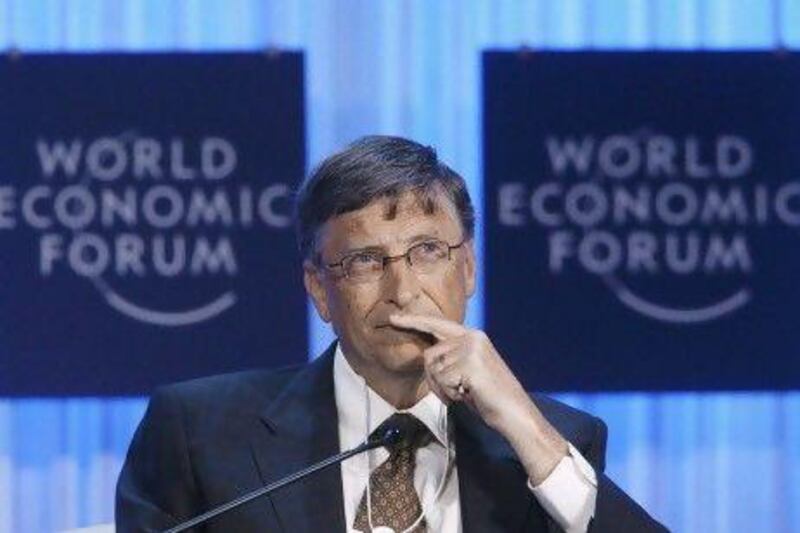Capitalism cannot solve problems facing the poorest people in the world, and governments and charities will always have to intervene, Bill Gates warned yesterday.
Speaking at the World Economic Forum in Davos, the billionaire Microsoft founder pledged a further US$750 million (Dh2.75 billion) to charity saying the "most critical problem" was to feed the 1 billion people who do not have enough to eat every day.
"Capitalism does not solve everything. It's not good with research and development, and it's bad at doing things for the poorest. The most feeble voice doesn't always get heard in the free-market system," he said during a panel debate on food security.
Food security has become an increasingly important issue for international investors and financiers. Governments around the world, including the UAE, have invested heavily in projects to ensure and protect food supplies.
"Our foundation [the Bill and Melinda Gates Foundation] is best known for its work in the health field, but for good health food is essential," Mr Gates said. "For the 1 billion who don't get enough food every day, the effects are very serious. Children die of malaria and pneumonia partly because of malnourishment.
"There has been a complacency about this problem among private business over the past four or five years, made worse by the effects of the financial crisis.
"These are tough economic times, but that is no excuse for cutting aid to the world's poorest."
He pledged the $750m to the Global Fund to Fight Aids, Malaria and Tuberculosis, a private-public partnership based in Geneva that accounts for about one quarter of all international funds to combat Aids and HIV, as well as most of the financing to fight malaria and tuberculosis.
Mr and Mrs Gates have previously donated $650m to the Global Fund.
Two days ago, Michel Kazatchkine, the Global Fund's executive director stepped down following criticism over the misuse of funds and cuts in public funding.
The Davos panel, entitled "Ensuring Food Security", posed the question: "How are new models of collaboration and innovation driving investment in food and nutrition security?"
Josette Sheeran, the executive director of the UN World Food Programme, said the world had never fed so many people, and there had never been so much abundance of food. Some 17 per cent more calories were produced now compared with 30 years ago, even though the consumer population had grown by 50 per cent.
"But 1 billion people will still be unable to guarantee that they can fill a cup with food each day, and 200 million people are affected by long-term malnutrition worldwide," she said.
"Investment in food and nutrition is logical and sound from a business point of view, but investment has been failing. It is not solving the problem. The world needs investment solutions."
Paul Polman, the chief executive of the giant British food group Unilever, said investment in food and agriculture had historically brought the highest return of any sector, but that the amount invested had fallen in recent years.
Mr Polman said the world needed a 70 per cent increase in food supply between now and the year 2050, which was the equivalent of all the food produced and consumed in the past 10,000 years.
He said the B20 organisation, a gathering of business interests that mirrors the Group of 20 (G20) leading and emerging economies, was addressing the situation, and would work on food security issues at the next G20 meeting in Mexico.
"The global agriculture and food business needs access to risk capital, as well as credit, insurance and equity investment," said Stefan Lippe, the chief executive of the Swiss Re insurance group.
Swiss Re had grown its business in the food and agriculture sectors in China and India, he added, and had shown it was profitable. "That's how to get money from financial markets," he said.





